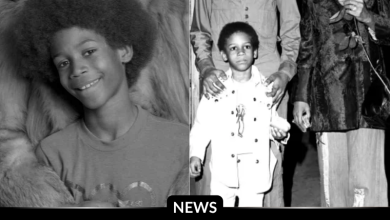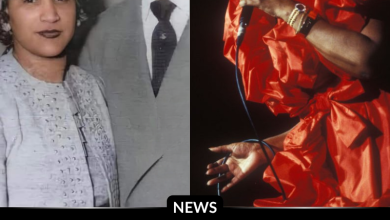“I Had to Get Away” — Dolly Parton Reflects on the Heartbreaking Moment She Left the Appalachian Mountains With 11 Siblings to Build One of the Greatest Careers in Music History
OPINION: This article may contain commentary which reflects the author's opinion.
Before the rhinestones, the sold-out arenas, and the record-breaking 42 Top 10 albums, Dolly Parton was simply a girl from the Great Smoky Mountains with a dream bigger than the Tennessee sky. But as the country music legend now reveals, her journey from a one-room cabin to international fame began not with triumph — but with heartbreak.
“I had to get away,” Parton shared. “But it was tough. Those mountains were my heart, my family, my songs. Walking away from them was the first real pain I ever knew.”
Growing Up With 11 Siblings and Boundless Dreams
Born in 1946 on Locust Ridge, Tennessee, Dolly was the fourth of twelve children in a poor but deeply loving family. Her father, Robert Lee Parton, was a sharecropper and farmer, while her mother, Avie Lee, filled their home with gospel hymns and laughter.
“We didn’t have much — just a roof, food when we could, and love,” Dolly recalled. “But Mama sang, Daddy worked hard, and we all learned early that laughter was free.”
Music was everywhere — in the church pews, in the wind over the hills, and in the soft hum of her mother’s voice. Dolly wrote her first song at age five and was performing in church soon after. By the time she turned 10, she was singing on local radio stations; by 13, she was appearing on Knoxville television.
Even then, she knew her destiny lay beyond the Smoky Mountains.
“I knew God gave me something special,” she said. “But to use that gift, I had to leave home — and that was the hardest part.”
The Day She Left the Mountains
The morning after her high school graduation in 1964, Parton packed her guitar, a notebook full of songs, and a single suitcase — then boarded a bus to Nashville.
“Mama was crying, and Daddy just stood there, quiet,” Dolly remembered. “He said, ‘You go make something of yourself, girl. Just don’t forget where you came from.’”
Her siblings — many still young — gathered to see her off. Dolly promised she’d make them proud.
But Nashville wasn’t easy. She had no money, no manager, and nowhere to live. “I slept on friends’ couches, sang for tips, wrote songs in notebooks that were falling apart,” she said. “There were nights I cried myself to sleep missing home. The city lights were pretty, but they didn’t keep you warm like mountain stars.”
From Small-Town Girl to Country Icon
Everything changed in 1967, when Parton joined The Porter Wagoner Show. Her duets with Wagoner made her a household name, but the transition to a solo career in the early 1970s revealed her full power as a songwriter and storyteller.
“People said I wouldn’t make it,” she recalled. “They saw a mountain girl in sparkly clothes. But I’d learned from my family that you’ve got to be tough and loud to be heard.”
With hits like “Jolene,” “Coat of Many Colors,” and “I Will Always Love You,” Parton redefined country music — blending honesty, humor, and heartbreak into songs that resonated far beyond Nashville.
“Every song I write has a little bit of that mountain dirt in it,” she said. “I may have left the Smokies, but they never left me.”
The Hardest Decision, the Greatest Reward
Today, with more than 42 Top 10 albums — more than any other artist in country history — Dolly can look back on that bus ride from Sevier County with gratitude and perspective.
“Sometimes you’ve got to leave the nest to learn how to fly,” she reflected. “It doesn’t mean you love your home any less — it means you want to carry it farther.”
She credits her upbringing — and her 11 siblings — for giving her the drive to persevere through rejection and hardship.
“When you grow up with that many kids in one house, you learn everything you need for the music business — how to share, how to stand your ground, and how to love no matter what.”
A Lifelong Love Letter to the Mountains
Even with her fame, Dolly never left her roots behind. In the 1980s, she built Dollywood in nearby Pigeon Forge — not just as a theme park, but as a tribute to her heritage and a source of jobs for her community.
“Dollywood isn’t just a park,” she said. “It’s a love letter to the mountains that made me. I wanted to give back to the people who raised me, even if I had to leave to do it.”
Her Imagination Library, which provides free books to children worldwide, is another tribute to her humble beginnings — proof that the girl who once dreamed by candlelight never forgot what it was like to have little but hope.
“I Never Really Left”
Decades after leaving that one-room cabin, Dolly says the mountains still call to her.
“I carry them with me everywhere — in my music, my heart, my soul,” she said. “I had to get away to make a life, but I never really left.”
From the hills of Tennessee to the stages of the world, Dolly Parton’s story is one of courage, humility, and the power of dreams.
She left the mountains to chase the music — and in doing so, she carried the spirit of the Appalachians to every corner of the globe.



